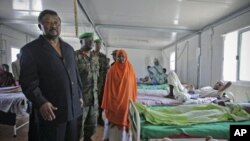An African Union report says many people are dying in famine-stricken Somalia because of international indifference to their plight. AU officials are urging the United Nations and the donor community to move quickly now that Somalia’s al-Qaida-linked militants are in retreat.
African Union Commission Chairman Jean Ping said Somalia’s famine is needlessly claiming lives that could have been saved if early famine warnings had been heeded.
In a report to the AU Peace and Security Council, however, Ping said recent security improvements in Mogadishu present a fresh opportunity to act on both the humanitarian and security fronts.
Aiding Somalis most in need
Briefing journalists after a council meeting Tuesday, Peace and Security Commissioner Ramtane Lamamra said he is encouraged by a surge in attention to Somalia, beginning with a U.N. Security Council meeting scheduled this week. He said the world body must take the lead in creating humanitarian corridors that would allow aid to reach Somalis trapped in the famine zone.
"It is politically necessary and technically doable. We need to put our minds together with a number of key players at the United Nations," said Lamamra. "U.N. Secretary-General Ban Ki-moon is convening a summit on Somalia on 23rd September and that would be the right place to consider all related issues. Humanitarian corridors are necessary given the risk of further degradation of the situation at the humanitarian level."
Lamamra said the Security Council should seize the moment created by last month’s retreat of al-Qaida-linked fighters from Mogadishu to take the kinds of action that could defeat the militants and allow distribution of life-saving food in the famine zone.
UN no-fly zone, maritime blockade
"We’ve been calling for more than a year for the U.N. Security Council to take steps to enforce a no-fly zone and maritime blockade in the territorial waters of Somalia," he said. "We… believe the time has come to take measures to implement those measures, which are likely to change the dynamics of the situation in Somalia. And also now that we have this pressing emergency in terms of assisting the people, they will not feel they are marginalized and are being ignored by the rest of the world."
Lamamra said five African countries are ready to send troops to Somalia to boost the AU’s AMISOM peace force from its current strength of 9,500 to 12,000 by the end of the year. He said the only thing preventing deployment of as many as 16,000 troops is the equipment, training and logistics, which must come from donors such as the United States and Europe.
"I think both Burundi and Uganda are ready to contribute the extra units that will take overall strength to 12,000, while Djibouti, Guinea-Conakry and Sierra Leone are also ready to provide troops," said Lamamra. "The pressing issue is for our traditional supporters, in terms of supplying equipment to move as fast as they could so battalions are properly trained and equipped for urgent deployment."
Adding reinforcements
Lamamra said improved security in Mogadishu highlights the need for deployment of international police units to replace AMISOM troops, who he said could then move forward to open up humanitarian corridors. He said a pledged battalion of Djiboutian police officers would be particularly welcome, since they can communicate with Somalis in their language.
The commissioner has in the past voiced disappointment at the world body’s failure to accept African recommendations aimed at defeating al-Shabab. But on Tuesday he expressed hope that this time, the urgency of the famine may finally tip the scales in favor of action that could not only save lives, but give Somalia’s feeble transitional government a chance to establish control after 20 years of anarchy.




